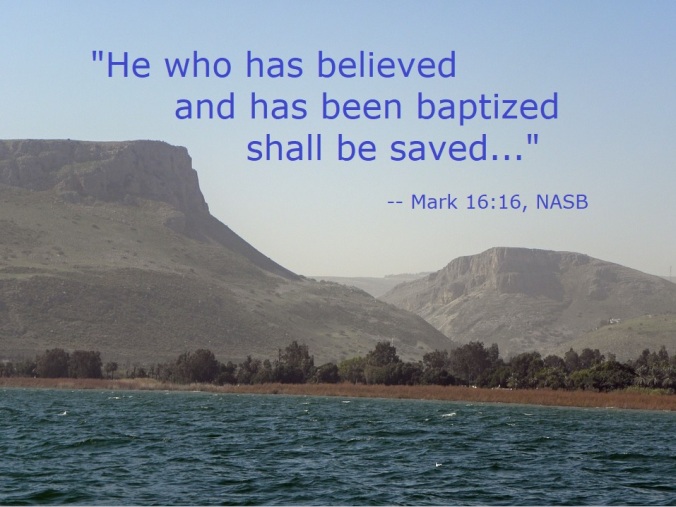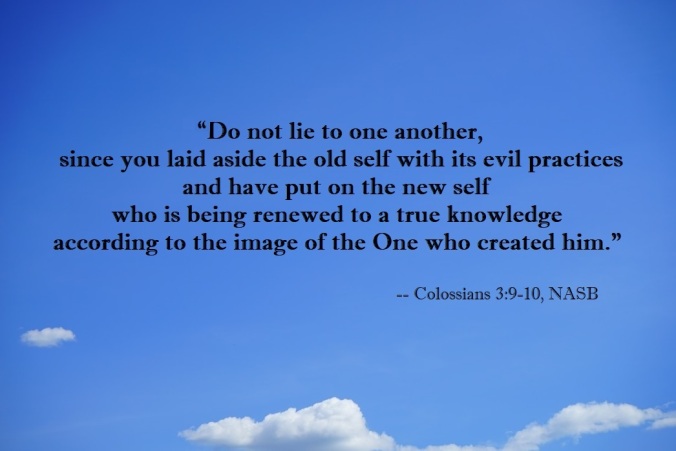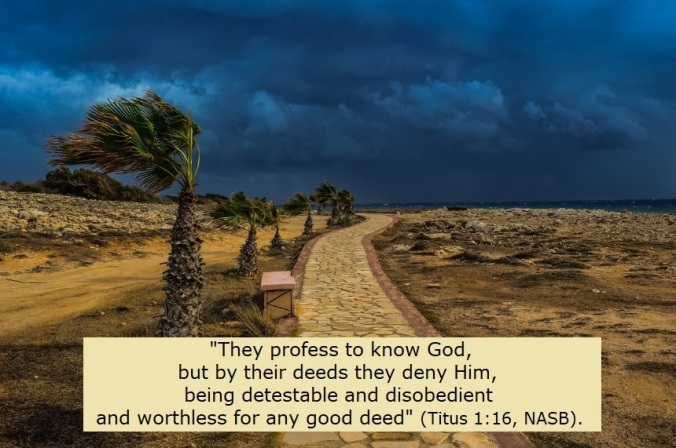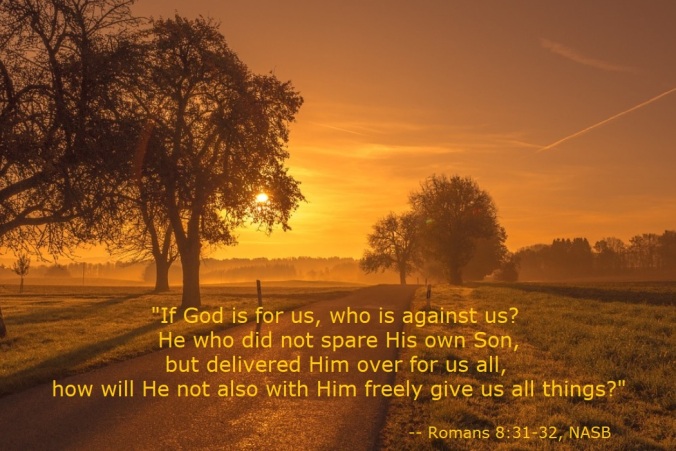“Go therefore and make disciples of all the nations…teaching them to observe all that I commanded you; and lo, I am with you always, even to the end of the age” (Matthew 28:19-20, NASB).
——————–
Contents:
1) When A Person Is Baptized (Bill Crews)
2) The Forgotten Rule (David Sproule)
3) Our Way Day by Day (Dan Shipley)
——————–

-1-
When A Person Is Baptized
Bill Crews
When a person is baptized as God requires, or as the Bible teaches:
1. He has already heard the gospel (good news) of Christ, so he has been taught. Mark 16:15-16; Acts 18:8. In the New Testament every instance of baptism is preceded by teaching.
2. He has already believed that gospel, thus he has already believed with all of his heart that Jesus is the Christ, the Son of God. Mark 16:15-16; Acts 15:7; 18:8; 8:35-38
3. He has already repented of his sins against God, for this repentance is both essential and precedes baptism. Acts 2:37-38; 3:19; 17:30
4. He has already confessed who Jesus is, the Christ, the Son of God, our Lord; and this confession precedes baptism. Acts 8:35-38; Romans 10:9-10
5. He receives salvation (Mark 16:16; 1 Peter 3:21), remission of sins (Acts 2:38). He has his sins washed away by the blood of Christ (Acts 22:16; Revelation 1:5; 7:14). He enters Christ (Romans 6:3; Galatians 3:27) and the spiritual body of Christ, the church (1 Corinthians 12:13). He dies to sin (Romans 6:1-4). He becomes a disciple of Christ (Matthew 28: 19; Acts 14:21). He becomes a child of God (Galatians 3:26-27). He enters the kingdom of heaven or the kingdom of Christ (John 3:3, 5; Colossians 1:13).
6. He has obeyed “from the heart” that “form of teaching (or doctrine)” unto which he was delivered (Romans 6:17-18). Just as Christ for our salvation experienced a death, burial and resurrection, so he has had a similar experience in dying to sin, being buried with Christ in baptism, and being raised to walk in newness of life (Romans 6:3-4). Thus, it was the decision and desire of that person, done because he wanted to, done not to please any man, but God himself (Galatians 1:10).
7. It should be a happy, joyous occasion (Acts 8:38). “’Tis done this great transaction’s done; I am my Lord’s, and He is mine.” “Happy day, happy day, when Jesus washed my sins away.” (From the song, “O Happy Day.”)
8. He is now ready to change his life because he has become a new creature, old things have passed away, and all things have become new. 2 Corinthians 5:7; Colossians 3:1-17
9. He has a new master, Christ; self has been dethroned, and Christ has been enthroned in that person’s heart and life; his life is now committed to doing the will of Christ in all things (Galatians 2:20; Matthew 16:24). He is now the Lord’s bondservant (Romans 6:16-18).
10. He has begun a journey, embarked upon a voyage, entered a race, enlisted for life in an active army (2 Timothy 4:7; Hebrews 12:1; 1 Timothy 6:12; 2 Timothy 2:3-4).
Please take time to read these verses and to digest these thoughts.
— Via The Roanridge Reader, Volume 33, Issue 45, Page 03.
——————–

-2-
The Forgotten Rule
David Sproule
It used to be one of the most recognized rules in our society. People knew it. People could quote it. And people even practiced it. (At least, many did.)
The paraphrased version says, “Do unto others as you would have them do unto you.” The Golden Rule. Unfortunately, the gold in that rule seems to have become tarnished in recent years in our nation. The very thought of “thinking about what someone else might need” or “thinking about what might be best for another person” is COMPLETELY foreign to many in our land today. All that many folks can seem to think about is SELF and what will satisfy SELF.
Which rule do you live by? Jesus’ “rule”: “Do unto OTHERS” (Matt. 7:12)? Or man’s rule: “Do unto SELF”? One rule will create harmony and peace in our homes and in our country. The other rule will destroy harmony and peace in our homes and in our country. It takes genuine effort, but may God help us to “esteem others better than” ourselves (Phil. 2:3).
— Via the Weekly Bulletin of the church of Christ in Santa Clara, California, September 30, 2018
——————–

-3-
Our Way Day by Day
Dan Shipley
“Wherefore we faint not; but though our outward man is decaying, yet our inward man is renewed day by day” (2 Cor. 4:16). The “outward man” is simply the house of the inward man. Day by day that house is “decaying” and wasting away. Who, past forty, needs reminding? Nevertheless, with relentless rapping on the door of our minds come the messengers of aging; the hoary head, the stooped shoulders, the wrinkled skin, the dimmed vision, and all the other infirmities that won’t let us forget what Paul says. All men know that much. But God’s people know something else.
They know that just as surely as the outward man is decaying, the inward man is being renewed day by day. They know that for the faithful Christian, growing older means growing better. He is growing better because he is growing in the knowledge of God’s word. As the newborn babe, he continually longs for the “spiritual milk which is without guile” (1 Pet. 2:2). As he grows in knowledge of the word, he also grows in the faith that is produced by the word (Rom. 10:17). As he grows in knowledge and faith, he also grows in usefulness to the cause of Christ. He is renewed in his determination to live closer to the Lord, to do what is right and oppose all wrong. In his spiritual growth, the aging Christian has learned that death is not the end, but merely a transition to something very far better. The happy anticipation of being in the Father’s house makes leaving this worn-out tabernacle a welcomed blessing!
That’s why the apostle Paul saw death as gain. But death is gain only when living is for the Lord. Every living man knows that he will keep his appointment with death (Heb. 9:27). He should know that living for the Lord is living at its best because it is living that prepares for death. Though the outward man is perishing and bound for the dust, we nourish and cherish him; we spare no expense to care for him and tend to his needs. Will we neglect the needs of the inward man that we know will survive the grave? With every tick of the clock and every beat of the heart we are getting closer to the end of this life.
The question is, are we getting closer to heaven?
— Via The Auburn Beacon
——————–
“O give thanks to the LORD, for He is good; For His lovingkindness is everlasting” (1 Chronicles 16: 34, NASB).
——————–
The Steps That Lead to Eternal Salvation
1) Hear the gospel, for that is how faith comes (Rom. 10:17; John 20:30-31).
2) Believe in the deity of Christ (John 8:24; John 3:18).
3) Repent of sins (Luke 13:5; Acts 17:30).
4) Confess faith in Christ (Rom. 10:9-10; Acts 8:36-38).
5) Be baptized in water for the remission of sins (Mark 16:16; Acts 2:38; 22:16; Rom. 6:3-4; Gal. 3:26-27; 1 Pet. 3:21).
6) Continue in the faith, living for the Lord; for, if not, salvation can be lost (Heb. 10:36-39; Rev. 2:10; 2 Pet. 2:20-22).
——————–
Tebeau Street
CHURCH OF CHRIST
1402 Tebeau Street, Waycross, GA 31501
Sunday services: 9:00 a.m. (Bible class); 10 a.m. & 5 p.m. (worship)
Wednesday: 7 p.m. (Bible class)
evangelist/editor: Tom Edwards (912) 281-9917
Tom@ThomasTEdwards.com
http://thomastedwards.com/go (Older version of Gospel Observer website without pictures, but back to March 1990)
http://tebeaustreetchurchofchrist.org/
http://ThomasTEdwards.com/audioser.html (audio sermons)




